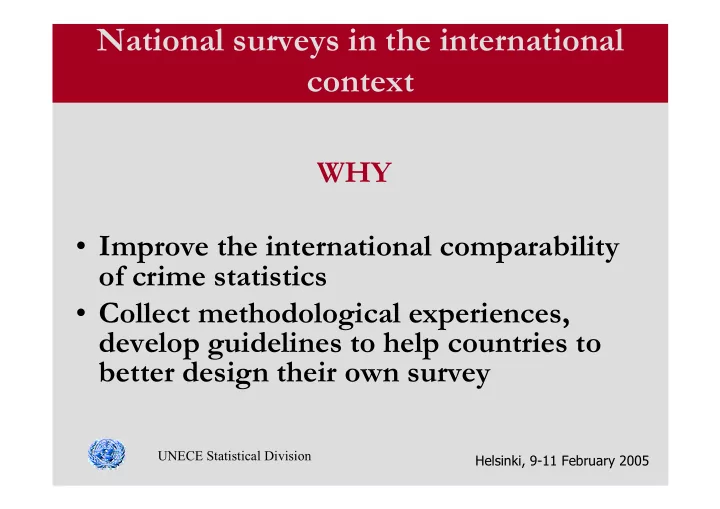

National surveys in the international context WHY • Improve the international comparability of crime statistics • Collect methodological experiences, develop guidelines to help countries to better design their own survey UNECE Statistical Division Helsinki, 9-11 February 2005
National surveys in the international context 4 Countries experience in Crime Victimization Surveys • U.S.A. • U.K. • Italy • Australia UNECE Statistical Division Helsinki, 9-11 February 2005
Australia: Assault Prevalence Rates Source: Libreri C. ABS 10 9 8 7 6 5 4 3 2 1 0 National Crim e Personal Sefety ICVS G eneral Social and Sefety Survey Survey Survey UNECE Statistical Division Helsinki, 9-11 February 2005
National surveys in the international context 4 Countries experience in Crime Victimization Surveys • Objectives • Methodology • Definitions • Type of crimes UNECE Statistical Division Helsinki, 9-11 February 2005
National surveys in the international context Objectives • Calibration/comparison of administrative records • Measure of victim risk • Crime independently by police • People definition of crimes • Public confidence in police/reporting behaviour • Data for performance management • Feelings of safety/fear of crime • Information on victims and offences UNECE Statistical Division Helsinki, 9-11 February 2005
National surveys in the international context Objectives There is a common ground UNECE Statistical Division Helsinki, 9-11 February 2005
National surveys in the international context Methodology: Population • USA: 12 years and over • Italy: 14 years and over • Australia: 15 years and over (NCSS) UNECE Statistical Division Helsinki, 9-11 February 2005
National surveys in the international context Methodology: Population • Data can be provided for a common population (15 years and above) • Guidelines on how interviewing minors (domestic violence?) UNECE Statistical Division Helsinki, 9-11 February 2005
National surveys in the international context Methodology: Reference Period • USA: 6 months • Italy, UK: 12 months • Australia: 12 months (NCSS) • ICVS: 3-15 months UNECE Statistical Division Helsinki, 9-11 February 2005
National surveys in the international context Methodology: More then a common reference period: How to deal with the Telescoping effect • USA: Bounding and reducing the reference period • Italy: funnelling + recording month and year of the last event How many cases the bounding corrects for? Are two consecutive surveys enough for bounding? UNECE Statistical Division Helsinki, 9-11 February 2005
National surveys in the international context Methodology: Survey Mode • USA: personal interviews + CATI • Italy: CATI • Australia: self-compilation, face-to-face interviews + telephone interviews (if respondent requests) • ICVS: CATI To have the respondent alone is an issue UNECE Statistical Division Helsinki, 9-11 February 2005
National surveys in the international context Methodology: Questions design Put the survey in a context Improvement of the screening to help the respondent to recall and understand the type of crime (give examples of places and circumstances) Improvement of the screening for sensitive crimes UNECE Statistical Division Helsinki, 9-11 February 2005
National surveys in the international context Where to go? • Compare methods, definitions, coverage of crimes • Explore the possibility to develop a common minimum set • Develop international/regional guidelines • Include victimization surveys into the agenda of official statistics UNECE Statistical Division Helsinki, 9-11 February 2005
National surveys in the international context Needed Guidelines • Telescoping • Mode of survey (personal contact, respondent alone) • Reference period • Question design (particularly for sensitive topics such as sexual assault) • Interviewer effect (male/female interviewers) • Definitions of crime • Consumed/attempted crimes • Definition of reporting crimes • Non responses • Sampling • ……… UNECE Statistical Division Helsinki, 9-11 February 2005
How far can we go? • Is it possible to identify common definition of (some) crimes covered by national surveys? • Is it possible to agree on a common reference period (question validity/coverage of crimes)? • To keep the national specificity and provide a minimum set of comparable data (learning from the ICVS)? UNECE Statistical Division Helsinki, 9-11 February 2005
ECE Task Force on Crime Statistics • Inventory of victimization surveys • Development of guidelines UNECE Statistical Division Helsinki, 9-11 February 2005
Recommend
More recommend